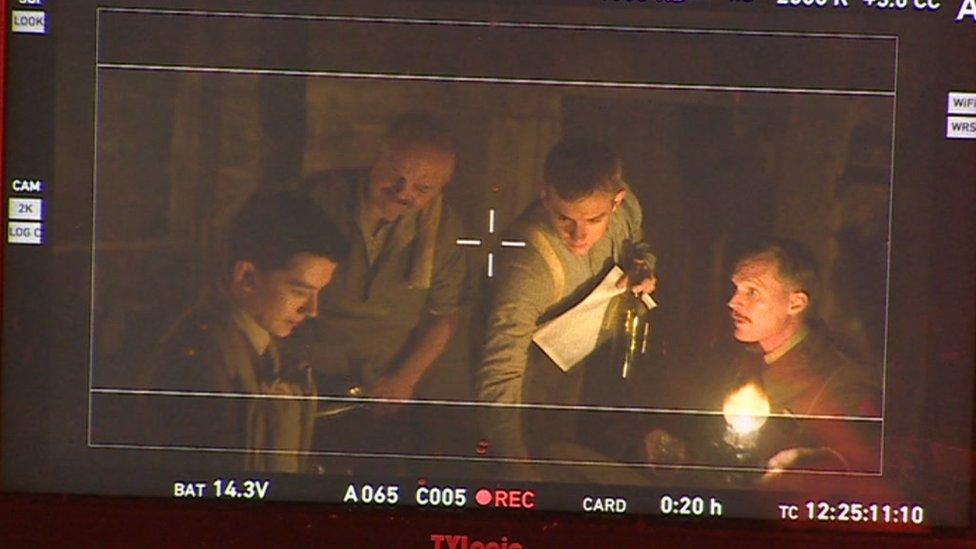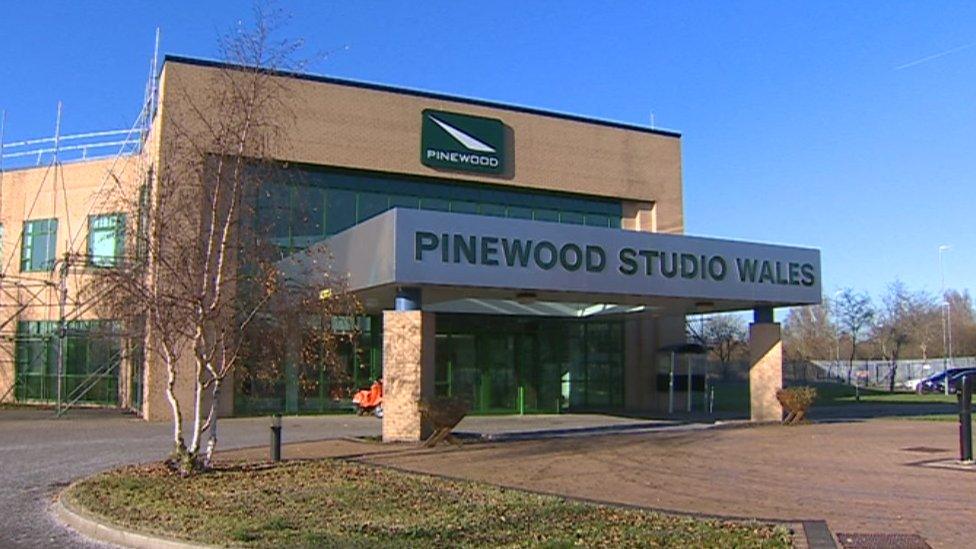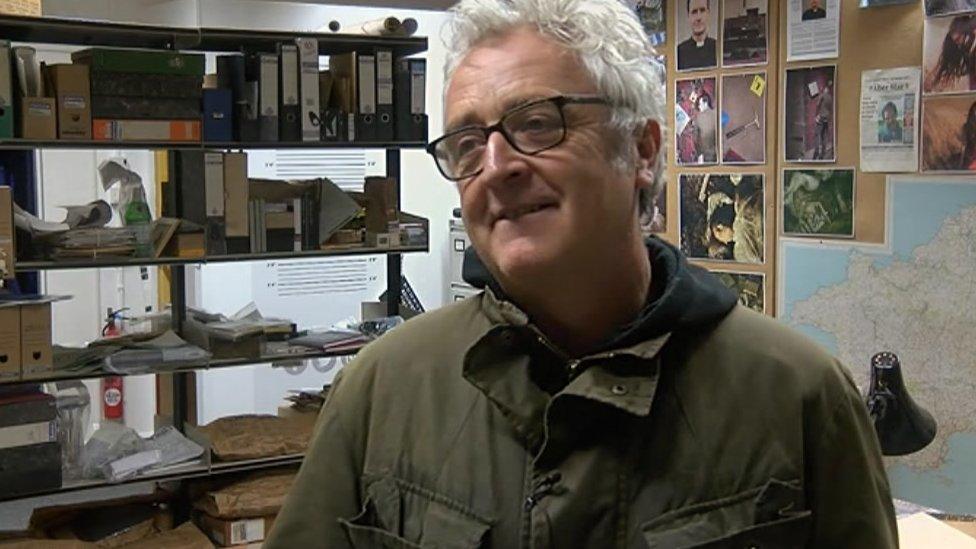Wales' creative industries: Subsidies and skills behind success
- Published

A scene from Journey's End, which has been filmed at Pinewood Studios
The creative industries remains one of Wales' fastest-growing sectors of the economy. But how much of that success has been fuelled by government subsidy and ministerial intervention?
Welsh studios are fully booked and there are Hollywood stars on set.
But it is a situation which has taken years of government investment and several false starts.
In the car park of Pinewood Studios in Cardiff, the film producer Guy de Beaujeu tells me why he chose to make his latest film here.
"One word answers that - finance," he said, before explaining how the Welsh Government's media investment budget, a fund operated on a commercial basis by Pinewood, enticed him over the Severn Bridge.
"There was no doubt that the government's involvement in the fund, and encouraging film businesses into Wales, was the reason we were here."
In the complex world of film finance there are few guarantees.
So when Guy de Beaujeu was planning to make Journey's End, a film about trench life in World War One, the offer of support from the Welsh Government helped make it happen.
A condition of the fund meant at least 50% of filming has to happen in Wales.
Guy de Beaujeu said financial support from the Welsh Government made Wales an attractive place to film
The film stars Sam Claflin, Asa Butterfield and Paul Bettany, and uses locations such as Tredegar House in Newport and Old Beaupre Castle near Cowbridge.
But much of the action takes place on a specially-constructed film set mimicking the trenches and dug-outs of the battlefield.
It could have been shot at any of the acres of studio space available across the UK, but Mr de Beaujeu said the government's investment brought it to Wales, where the film itself was making an economic impact.
"We are spending more in Wales than they are giving us, so there is a net benefit there," he said.
"Bear in mind that we are working with a team that at any one time has had well over 100 people on set, all of whom are being fed, being housed and being generally looked after.
"Plainly they are not all Welsh but there is a large percentage of our crew who have been Welsh.
"In fact, interestingly, I would say that the Welsh Government have been so successful in their programme of bringing productions into Wales that actually it has become more and more difficult to find the crew because they are all making other stuff."
Talent hunters
It is not just visiting film crews which struggle to find enough talent to make their productions.
Animation studio Bait, based in Cardiff Bay, relies on recent Welsh graduates and talent recruited from further afield to work on the array of TV series, feature films and visual effects projects that reach its offices.
One of its most recent projects stars in the BBC's Christmas schedule. Bait's animation arm, Cloth Cat, completed post-production work on Ethel & Ernest earlier this year.
It is a charming animated film based on the graphic novel by The Snowman creator Raymond Briggs and will be shown on BBC One on 28 December.

The animation company behind Ethel & Ernest is based in Cardiff
Bait Studio's managing director Jon Rennie admitted it had been "tough" to find the staff needed to meet the increasing work his company had won.
"It is tough because you want to find good people who are trained and who are also happy to remain in Cardiff," he explained.
"This is an industry that is very mobile, so we are always competing not only with London, with Manchester, with other places around the UK but also around the world."
Mr Rennie said the sustainability of the creative industries relied on basing productions and intellectual property (IP) in Wales.
"It's very easy for productions to come in, use the local facilities and move away again. The important thing about making it sustainable is for repeated series to happen, and for there to be people who are based here and to be enthusiastic about keeping the work here," he said.
"It's the same all over the world. There could always do with being more skilled people.
"But the important thing is to make sure the productions have their heart in Wales, and that while they are not necessarily reflecting Welsh culture, they are based around Welsh creativity."
Jon Rennie said the sustainability of Welsh creative industries relied on basing productions in Wales
The recent success of Wales' film and TV industry is in stark contrast to its bumpy beginnings, when promises in the 2000s of a Valleywood studio and its film-set glamour flopped.
Since the beginning of this decade, the Welsh Government's focus on the creative industries has led to more tangible success.
So is it time for ministers to stem the flow of loans and investments to the sector?
Economy Secretary Ken Skates said continuing to help finance film and TV productions was vital if the industry was to become a long-term success.
"There's no doubt when you're starting from a low base you have to have a very pro-active government that is determined to make a success of a new economic sector, and that is what we have done," he said.
"But over time our support translates into the development of a better skills base, and ultimately for the long term it's the availability of skills and the infrastructure that will determine whether or not the creative industries thrive in Wales.
"Where we are right now, we have great technical skills, we have great facilities as well. Between the two, I'm confident that the creative industries have a very strong future."
Studio boom
Journey's End is one of four productions currently using Pinewood Studios near Cardiff's docks.
Dragon Studios near Pencoed, where the Valleywood dream began, now hosts the filming of a ten-part US TV series focussed on the exploits of a young William Shakespeare.
Recent graduates from the University of South Wales are among the crews helping to make films and TV series in Wales. The university has recently expanded its Cardiff campus to meet the demand for qualifications from students and the industry.
The dean of its faculty of creative industries, Jane McCloskey, said its students had to develop a portfolio of skills to meet industry demands.
"We have students who leave not just with the skills and the ability to do a job, but they leave with skills and ability to work in a multi-faceted way," Ms McCloskey said.
"So we might have students who have the ability to think like entrepreneurs, so we encourage students to understand how they can run their own businesses, and how they can have a portfolio career in the creative industries."
Ms McCloskey said the university was working with government and industry professionals to meet the long-term demands of the film and TV industry.
"It's very important that we are sharing that knowledge, and that we are really looking to see where the skills gaps for tomorrow are going to be," she added.
"Our role is very much to help fill those, not just for Wales but for the UK, and globally as well."

Back at Pinewood, filming on Journey's End is just wrapping up. As producer Mr de Beaujeu prepares to leave Wales, he remains optimistic about the long-term viability of the industry here.
"We want to go places where there are other creative people with other creative teams, and we need a hub that knows what's going on," he said.
"We need those suppliers that can come and deliver what we need to make a film.
"It feels to me like this is starting to work quite well, the supply chains seem to be working, people are used to coming down to Wales to film, and so that feels to me like it is just going to get bigger and bigger, actually."
Ethel & Ernest is on BBC One at 19:30 GMT on Wednesday 28 December
Journey's End will be released in cinemas later next year
- Published19 December 2016

- Published16 March 2015
